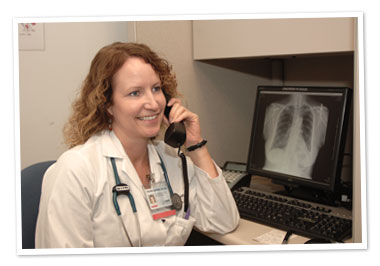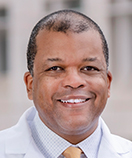Oncology background proves useful to cardiothoracic surgery nurse
UC Davis resource nurses work alongside physicians in providing the medical and social-support services necessary to assure successful outcomes for patients. Valerie Kuderer, for instance — a clinical nurse coordinator with the cardiothoracic surgery team — is indispensable because she coordinates all patient care.
 “I make sure patients have whatever they need and that all of their questions are answered,” said Kuderer, who works with surgeons who perform procedures for benign and malignant diseases of the lungs, esophagus, chest wall, airway and diaphragm — all surgeries in the chest other than cardiac surgeries.
“I make sure patients have whatever they need and that all of their questions are answered,” said Kuderer, who works with surgeons who perform procedures for benign and malignant diseases of the lungs, esophagus, chest wall, airway and diaphragm — all surgeries in the chest other than cardiac surgeries.
As a nursing coordinator, she helps patients move seamlessly from initial consultation in the clinic to post-operative, follow-up care, including requesting diagnostic tests, treating wounds, ordering medications, scheduling surgery, finding support groups and helping family members find nearby lodging. She also keeps referring physicians informed throughout the entire process.
“I provide continuity and help patients navigate what can be a very frightening experience,” she explained.
Known for her compassion and expertise, Kuderer first became intrigued by UC Davis as a nursing student in the 1990s. She completed some clinical training at the university, and what she saw impressed her.
“I decided then that this is where I wanted to work because UC Davis provides such excellent care,” said Kuderer, who has been at UC Davis her entire career. “We have a great team and the best technology. If you are going to have major surgery, you should have it done at a medical center where the most knowledgeable and skilled people will take care of you. That is what we offer.”
Kuderer’s career began in medical and surgical oncology. When the cardiothoracic surgery practice grew to the point where a full-time nurse was needed, she was recruited for her current position. She has a network of professional and personal resources to draw upon in supporting patients, including her background in oncology.
“I definitely gained the versatility it takes to support cancer patients,” she said. “That skill prepared me to work with thoracic surgery patients, who also have a wide variety of needs.”
In addition to being involved in all phases of patient care, Kuderer supports enrollment and approval processes for six different national clinical trials that are evaluating new treatments for lung and esophageal cancer. She also manages UC Davis’ participation in the Society of Thoracic Surgeons national database, providing invaluable information for quality-improvement goals. Two new projects involve working toward accreditation of a new surgery — called lung volume reduction surgery — for emphysema patients and coordinating participation in a national tissue bank that will lead to better treatments for lung cancer.
“I really appreciate all aspects of the work we do. It makes this a very rewarding position,” she said.






